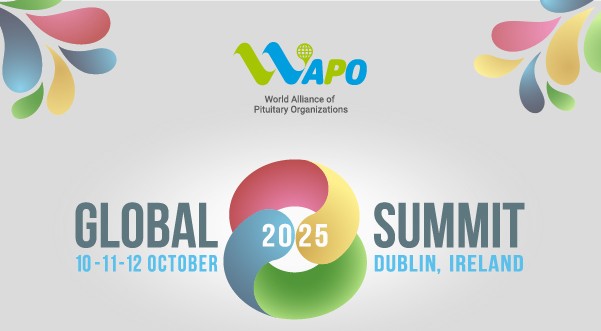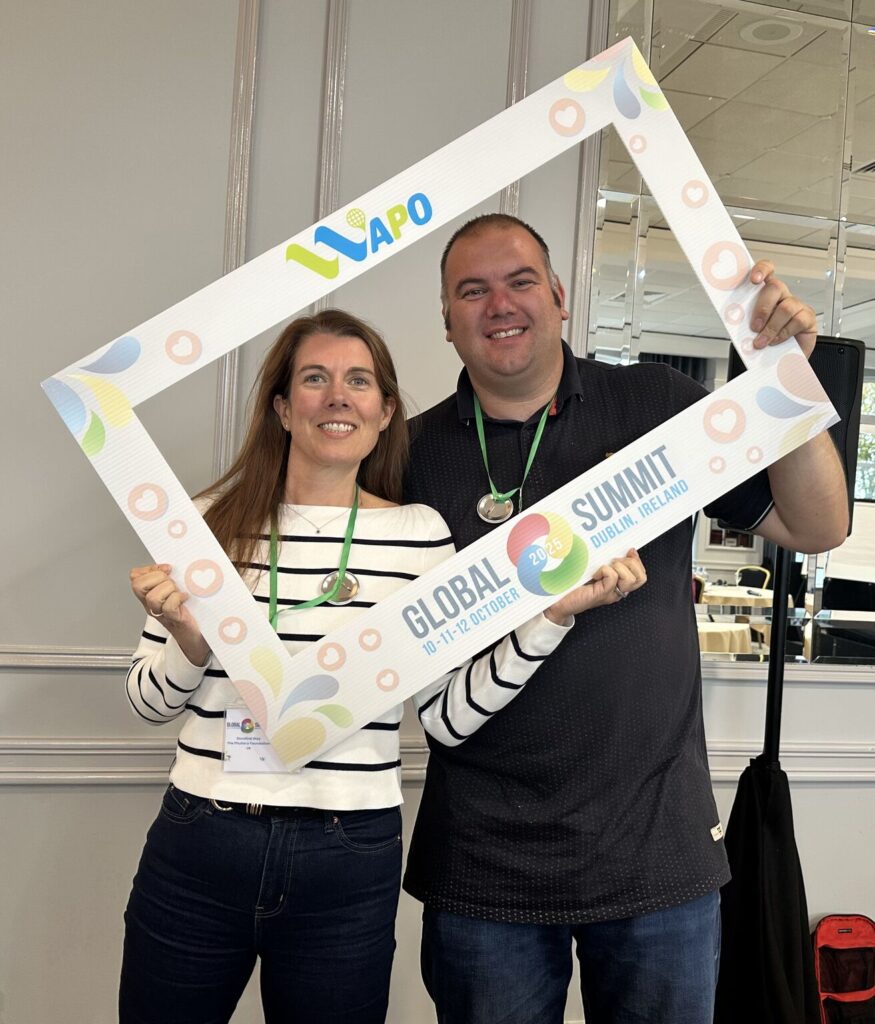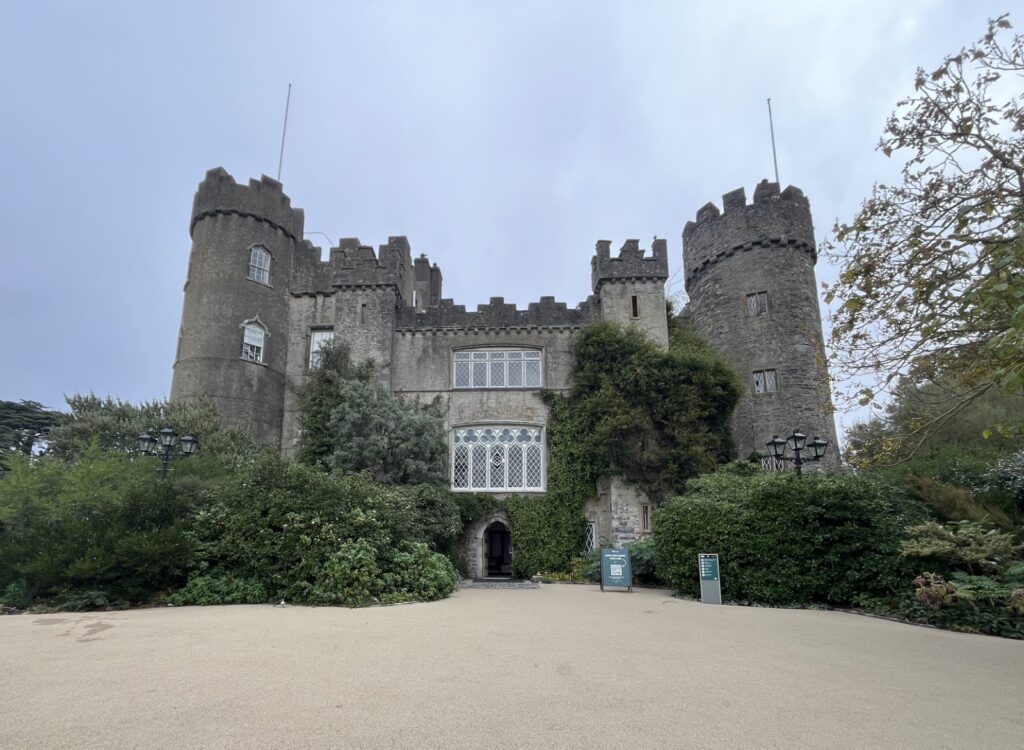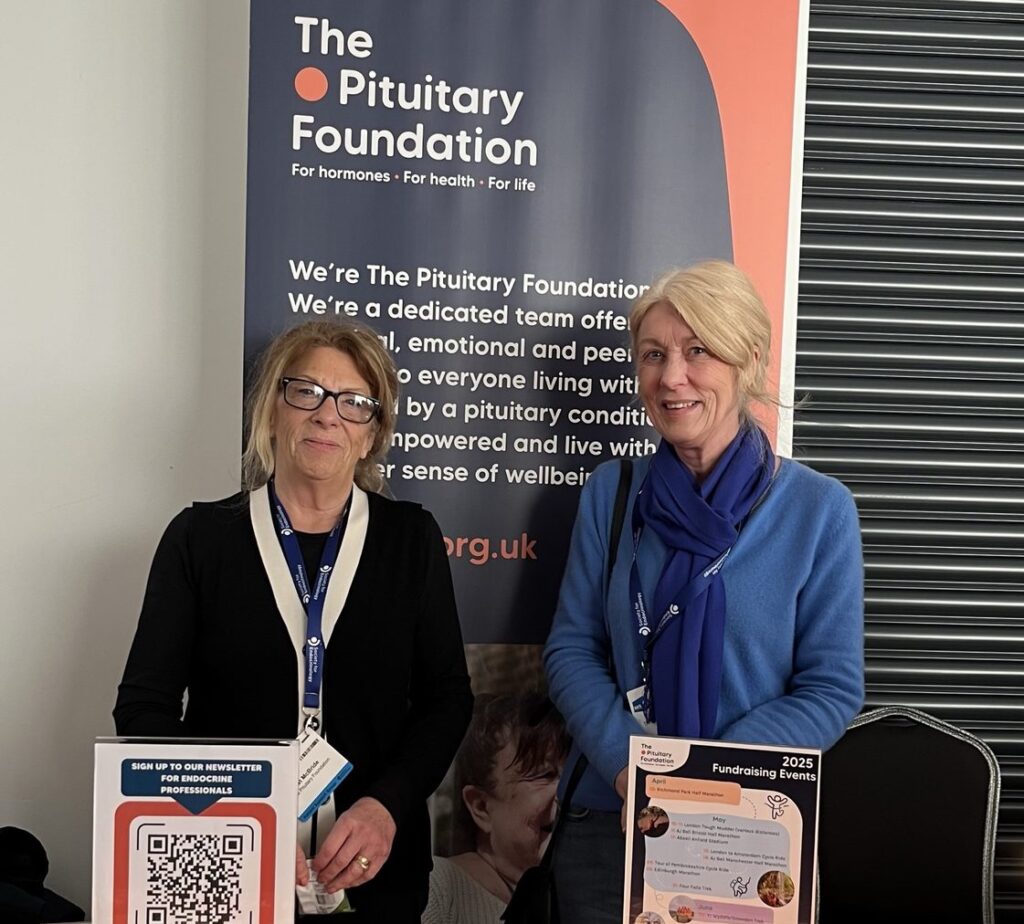Attending research conferences is an important way for charities to increase their recognition in the clinical arena, network with other organisations and keep up to date on research developments. We aim to attend relevant conferences to both support our work in this area and represent people affected by pituitary conditions to a wider clinical audience.
This October, the World Alliance of Pituitary Organisations (WAPO) held their annual Global Summit, in Dublin. This event was attended by two of our long-standing pituitary ambassadors and members of our Lived Experience Committee, Rosalind Way and Kevin Williams. We spoke to both Roz and Kevin to hear more about their experience of the weekend and their learnings from the Summit.

Reflections From the WAPO Global Summit 2025: A Global Community United by Patient-Centric Care, By Roz Way
From 10–12 October, I had the privilege of attending the World Alliance of Pituitary Organisations (WAPO) Global Summit 2025 in beautiful Malahide, Ireland—a stunning seaside venue that provided the perfect backdrop for three days of connection, learning, and collaboration.
This year, I attended in my role as ambassador for The Pituitary Foundation, having previously joined the Summit as a speaker in 2024. It was a different experience being a delegate, but no less impactful. The Summit brought together patient organisations from across the globe—India, Canada, Argentina, Denmark, Spain, and many more—to share insights, innovations, and lived experiences in pituitary care. While the focus was on patient organisations’ perspectives, we also heard valuable contributions from clinicians and researchers.
The sessions covered a wide range of topics, including advances in treatments for pituitary tumours, psychological health toolkits, clinical trial engagement, and the development of orthoptist-led pituitary clinics. What stood out most was the consistent emphasis on patient-centric outcomes—a theme that united all discussions and highlighted the power of collaboration across borders.
Networking with global peers was a highlight. I learned so much about the diverse experiences of patients in different countries—some journeys felt familiar, while others revealed striking differences in access, support, and care pathways. These conversations reinforced the importance of international solidarity and shared learning.
I also took part in the WAPO Annual General Meeting, where we explored the organisation’s future direction, upcoming projects (including a focus on acromegaly, which is particularly close to my heart), and plans for next year’s summit—WAPO’s 10th anniversary.
And I’m delighted to share some personal news: I’ve been invited to join the WAPO Board. I’m excited to contribute to shaping future events and supporting WAPO’s mission to empower patient organisations worldwide.
This summit was a powerful reminder that while our healthcare systems may differ, our shared commitment to improving the lives of those affected by pituitary conditions brings us together. I left Malahide feeling inspired, informed, and energised for the work ahead.

Coming Together to Make a Difference, By Kevin Williams
When The Pituitary Foundation sought volunteers to travel to Dublin for the 2025 WAPO Summit, my eyes lit up with excitement. The chance to represent such a worthy cause on an international stage was an opportunity I couldn’t resist. Stepping into the unknown, my journey began on Thursday, 9th October, with a midday flight from Liverpool’s John Lennon Airport.
With the help of the ever-welcoming Irish community, I soon found my way to Malahide; a charming coastal town boasting a historic castle, a picturesque harbour and an array of shops and eateries. It was the perfect town for such an inspiring weekend.

Friday marked the official start of the event. I met up with fellow Lived Experience Committee member, Roz Way, who greeted me warmly as we made our way to the conference room. Dan Jeffries would host the summit, and with his warm, enthusiastic energy, the event was sure to run smoothly.
All speakers at WAPO 2025 spoke intensely and passionately about their chosen subjects, and not one could be faulted. Daniela Shikova from FindMeCure (an organisation that helps patients find and apply to clinical trials) emphasized the vital importance of clinical trials and their role in advancing patient care. Lisa McAnena delivered a highly professional presentation on the mechanisms behind visual impairment and the methods used in testing. She was joined by Jaina Byrne, who enriched the discussion with her insights into the work of orthoptists. Dr Sofia Llahana reminded us of correctly medicating and the importance of preventing adrenal crises. Jo Balfour looked ahead to the future, introducing the concept of a patient passport — a roadmap designed to make healthcare journeys easier and more connected for every patient.
From Max Almonacid Palacois, a Chilean patient advocate, we learned about emotional management techniques; a timely reminder that wellbeing is not just physical but deeply emotional too.
Three talks truly captivated me and had me listening in awe. As a craniopharyngioma survivor, I was deeply moved by the presentation from Dr Mark Sherlock, an endocrinologist, and Mr Monseh Javadpour, a consultant neurosurgeon. They delivered an exceptional session that walked us through the entire journey, from diagnosis and surgery to life after treatment and long-term management.
Dr Chris Yedinak gave two remarkable talks, one emphasizing the importance of recognising arginine vasopressin deficiency and how a simple name change can profoundly improve patient care.
Finally, Manel Puig Domingo spoke impressively about how collaboration with AI can accelerate the diagnosis of acromegaly, sharing his innovative work on integrating AI into medical practice to enhance outcomes.
What made the weekend truly unforgettable was the sense of community. Meeting other groups, advocates, specialists, and pharmaceutical representatives, each sharing their experiences and insights. Everyone was there for the same reasons: improving pituitary care worldwide.
Leaving Dublin, I felt a mix of tiredness and joy (the good kind that comes from being part of something truly special). I’d met amazing people, learned things that will stay with me, and felt part of a global family that really understands. It’s moments like these that remind me why I travelled to Ireland — because together, we can keep making a difference.
We want to say a huge thank you to Roz and Kevin for representing The Pituitary Foundation at this conference, and for bringing back such valuable insights and learnings.








